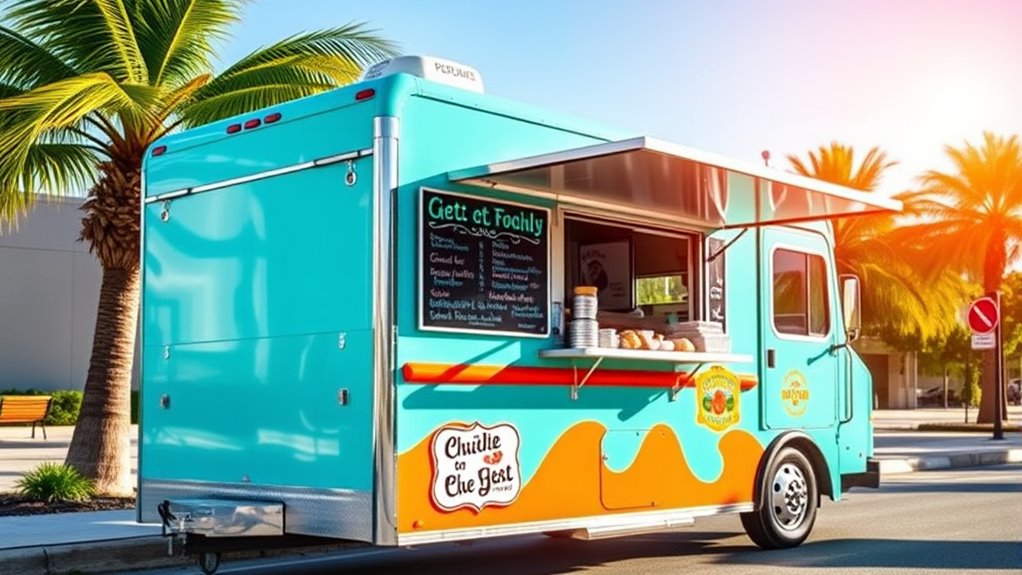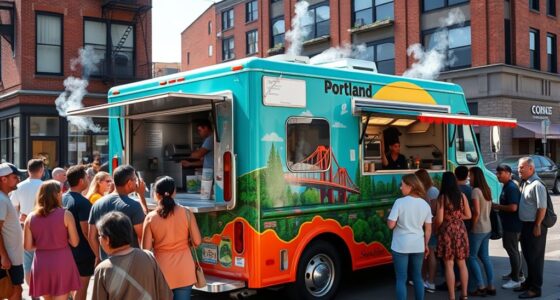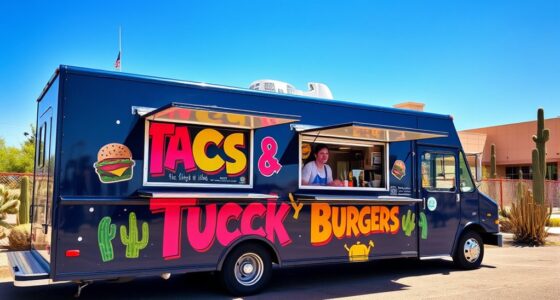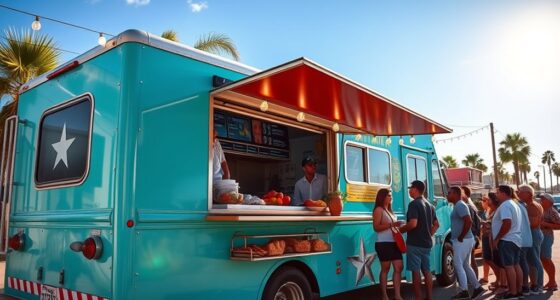To start a food truck in St. Petersburg, FL, you should first develop a solid business plan that defines your brand, target audience, and financial goals. Then, research local requirements like permits, zoning laws, and licensing, and apply online to streamline the process. Set up your kitchen, budget wisely, and secure financing if needed. Building a memorable menu and engaging with the community through events and social media will help you succeed—keep exploring to learn more about each step.
Key Takeaways
- Develop a detailed business plan including branding, target audience, and budget tailored to St. Petersburg’s market.
- Research and apply for necessary local permits and food safety licenses via online portals.
- Secure a compliant kitchen space and purchase essential equipment within your budget.
- Design an appealing menu with competitive pricing, sourcing local ingredients to attract customers.
- Implement marketing strategies like local influencer outreach and community engagement to build visibility.
Starting With a Business Plan
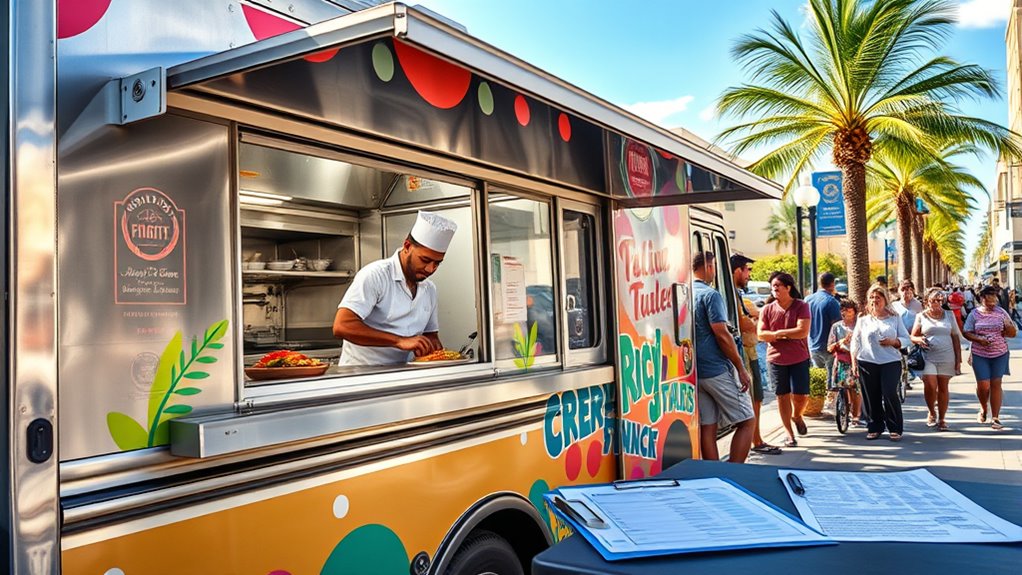
Have you thought about how a solid business plan can set the foundation for your food truck venture? It’s essential to define your food truck branding early on, so your truck stands out and attracts loyal customers. A clear plan helps you identify your target audience and tailor your menu and marketing strategies to boost customer engagement. By outlining your goals, budget, and operations, you’ll gain a better understanding of what it takes to succeed in St. Petersburg’s competitive food scene. Plus, a well-crafted business plan guides your branding efforts, ensuring consistency across your truck’s design, menu, and promotional activities. This focus builds recognition and trust, making it easier to connect with customers and grow your food truck business. Incorporating data-driven marketing strategies can further enhance your outreach and visibility in the local market.
Understanding Local Requirements
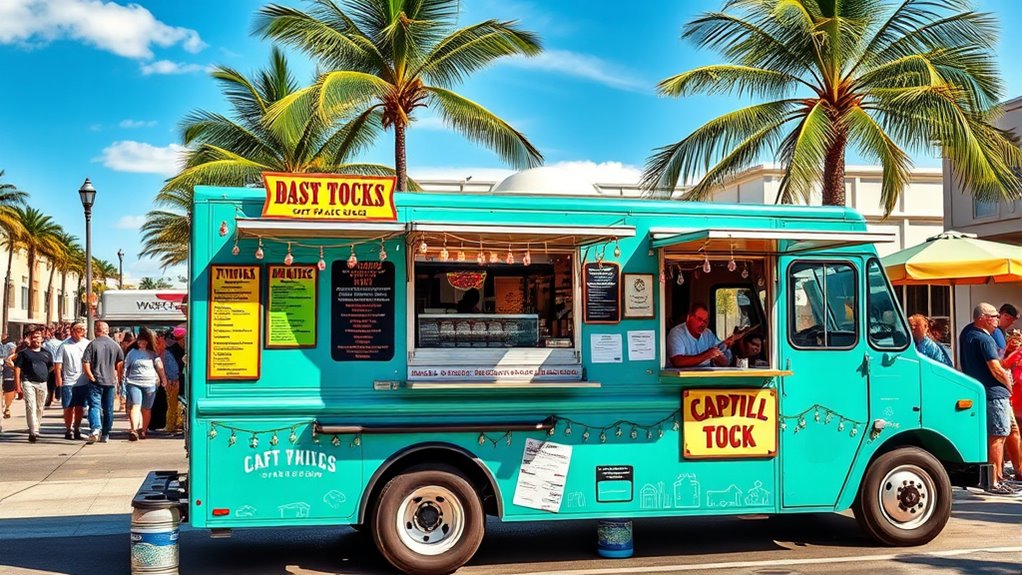
To get your food truck up and running in St. Petersburg, you need to understand the local requirements. You’ll want to use online permit application portals and review the food safety inspection checklist to stay compliant. Additionally, knowing the designated food truck zones helps you choose the best locations to operate legally and successfully. Developing an understanding of cultural nuances can also enhance your interactions with diverse local customers and stakeholders.
Online Permit Application Portals
Navigating the online permit application portals in St. Petersburg is straightforward once you comprehend the process. The city offers digital permit portals that simplify submitting your online applications. These portals allow you to complete and track your permit requests from any device, saving you time and effort. Before starting, make sure you have all necessary documents ready, such as business licenses and food service details. The portals guide you through each step, making it easy to fill out forms accurately. Be attentive to specific requirements, as some permits may need additional documentation. Once submitted, you can monitor your application status directly through the portal, receiving updates and notifications. Using these online applications streamlines your permit process and gets you closer to launching your food truck smoothly.
Food Safety Inspection Checklist
Understanding the local food safety inspection checklist is essential for ensuring your food truck meets all St. Petersburg requirements. This inspection checklist outlines specific food safety procedures you must follow, such as proper storage, sanitation, and temperature controls. You’ll want to familiarize yourself with these guidelines to prevent violations and ensure a smooth inspection process. Make sure your equipment is clean, food handlers follow proper hygiene practices, and all surfaces are sanitized regularly. Keeping detailed records of your food safety procedures can help during inspections and demonstrate your commitment to safe practices. By proactively preparing based on the inspection checklist, you’ll reduce the risk of delays and ensure your food truck operates safely and legally in St. Petersburg.
Designated Food Truck Zones
Knowing where you can set up your food truck is essential for compliance and smooth operations in St. Petersburg. Local zoning regulations designate specific areas for food truck parking, ensuring you operate legally and avoid fines. These designated food truck zones are often located near popular events, parks, and busy streets, making it easier to attract customers. Before setting up, check with the city’s zoning department to identify approved locations and any restrictions. Some zones may require permits or special permissions, so understanding these requirements early helps prevent disruptions. By adhering to these regulations, you’ll ensure your food truck operates smoothly within the law, making your business more sustainable and successful in St. Petersburg.
Setting Up Your Base of Operations
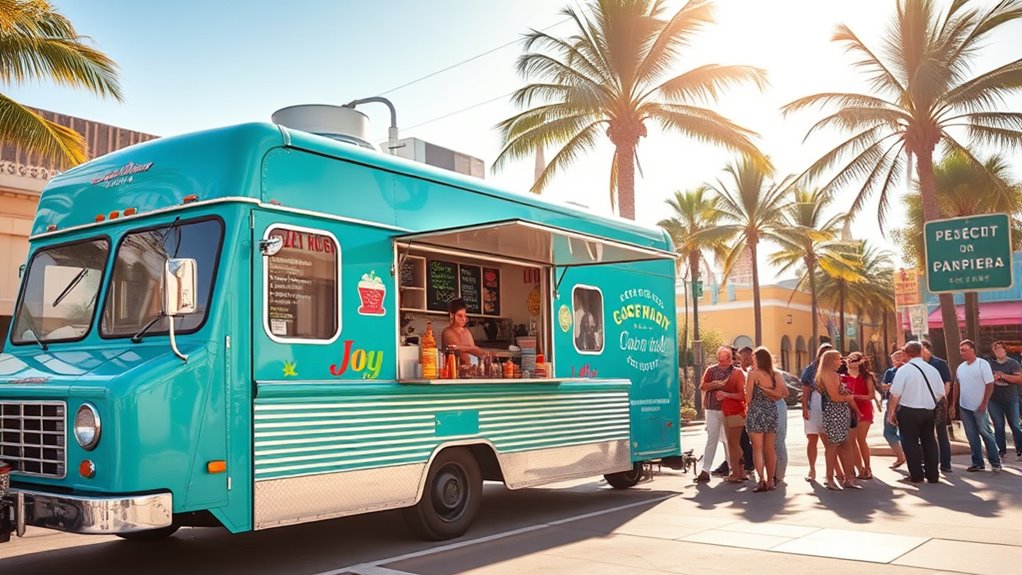
When setting up your base of operations, you’ll need to consider shared kitchen licensing requirements to stay compliant. Choosing the right custom kitchen equipment is also essential for efficiency and food quality. Make sure both aspects align with local regulations to keep your food truck running smoothly. Additionally, optimizing your space for aquatic exercise options can be beneficial if your business plans to incorporate water-themed promotions or events.
Shared Kitchen Licensing Requirements
Setting up your food truck in St. Petersburg requires understanding shared kitchen licensing requirements. To operate legally, you’ll need to secure a shared kitchen license that meets local compliance regulations. These regulations guarantee your facility adheres to health and safety standards, which are vital for food safety and avoiding penalties. Shared kitchens are cost-effective, but they must be properly licensed and inspected before use. You’ll need to provide documentation proving your kitchen’s compliance with sanitation and safety codes. Regular inspections may be necessary to maintain your license. Keep in mind that each shared kitchen may have specific requirements, so confirm that your chosen space aligns with local licensing standards. Staying compliant ensures your food truck can operate smoothly without legal issues.
Custom Kitchen Equipment Selection
Choosing the right custom kitchen equipment is essential for ensuring your food truck runs efficiently and meets all safety standards. Your equipment selection impacts workflow, food quality, and compliance. Focus on durable, space-saving appliances tailored to your menu. Prioritize multi-functional tools to maximize limited space and efficiency. Consider the table below to guide your equipment choices:
| Equipment Type | Key Features |
|---|---|
| Commercial Stove | High heat output, energy-efficient, easy to clean |
| Refrigeration Units | Compact, reliable, maintains proper food storage |
| Prep Stations | Durable surfaces, adequate workspace, ergonomic |
Proper custom kitchen equipment selection streamlines operations, boosts productivity, and keeps your food truck compliant with health regulations.
Budgeting and Financing Your Food Truck

To get your food truck off the ground, you need to understand the initial equipment costs and how they break down. Exploring small business loan options can help you secure funding, while liability coverage is essential for protecting your investment. Proper budgeting guarantees you’re financially prepared to start and sustain your food truck business. Additionally, researching for sale 100 equipment and supplies can provide insight into competitive pricing and quality options.
Initial Equipment Investment Breakdown
Budgeting for your food truck’s initial equipment is a critical step that requires careful planning. Your investment breakdown should include essential items like cooking appliances, refrigeration, serving counters, and safety gear. Expect to allocate a significant portion of your budget to the truck itself, but don’t overlook the costs of kitchen essentials such as grills, fryers, and prep tables. Additionally, consider equipment for storage and sanitation to meet health regulations. You’ll also need point-of-sale systems and signage, which can vary in cost depending on quality and features. While initial equipment costs can seem high, investing wisely ensures smooth operations and quality service. Keep detailed records of your investment breakdown to stay on top of your budget and avoid surprises down the line.
Small Business Loan Programs
Are small business loan programs a viable option to finance your food truck? They can be a great way to access funding opportunities that cover equipment costs, permits, and initial expenses. To get started, you’ll need to understand the loan application process, which typically involves preparing financial documents, a solid business plan, and proof of your ability to repay. Many lenders offer specialized small business loans tailored for food trucks, often with competitive interest rates. Applying can seem intimidating, but thorough research and a clear financial picture will improve your chances. Keep in mind that securing a loan can provide the capital you need to launch smoothly, making it a smart step in your budgeting and financing strategy.
Liability Coverage for Food Trucks
Liability coverage is an essential component of your food truck’s budget, as it protects you from costly claims and legal expenses. When considering insurance, you need to evaluate coverage options that address legal liabilities, such as accidents, injuries, or property damage. Adequate liability insurance helps shield your business from financial setbacks if someone gets hurt or if your truck causes damage. It’s vital to understand the insurance considerations involved, like coverage limits and exclusions, to guarantee you’re fully protected. Without proper liability coverage, you risk facing significant out-of-pocket costs and legal disputes that could jeopardize your food truck operation. Prioritize finding comprehensive insurance plans that align with your budget while providing peace of mind against unforeseen incidents.
Designing Your Menu and Pricing Strategy
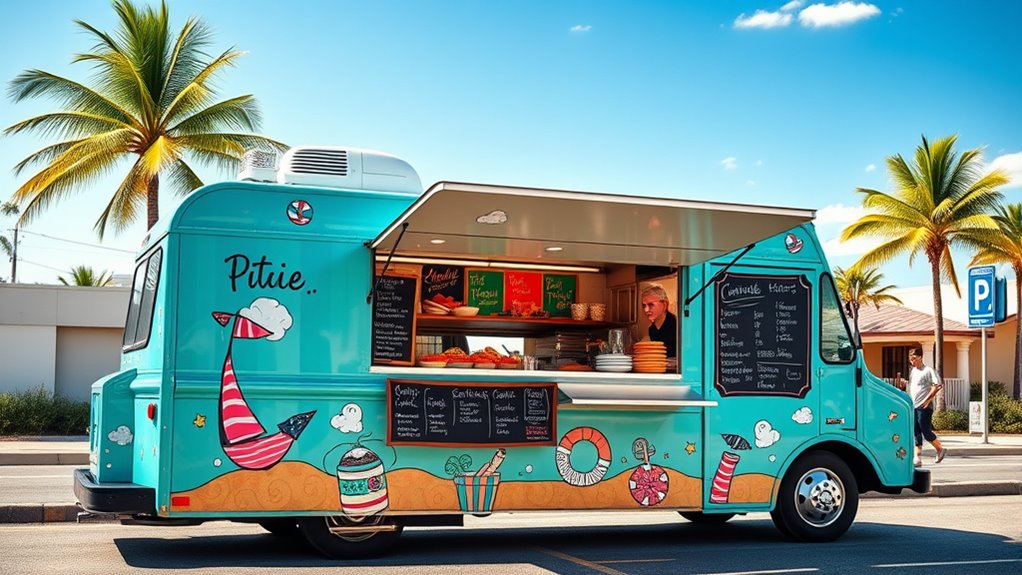
When designing your menu, consider sourcing unique local ingredients to stand out and appeal to your community. Keep a close eye on cost control to maintain healthy profit margins without compromising quality. Balancing creative offerings with smart pricing ensures your food truck remains profitable and popular. Additionally, exploring cost-effective sourcing options can help you optimize expenses while maintaining high-quality ingredients.
Unique Local Ingredient Sourcing
Leveraging unique local ingredients can set your food truck apart and create a memorable menu that resonates with the St. Petersburg community. Focus on sustainable sourcing by building strong relationships with local farmers, ensuring fresh, high-quality ingredients. Partnering with local farmers not only supports the community but also allows you to access rare, seasonal produce that can elevate your dishes. Incorporate these ingredients into your menu creatively, emphasizing their freshness and story to attract customers. Highlight your commitment to sustainability and local partnerships in your branding and marketing efforts. By sourcing locally, you’ll also reduce transportation costs and carbon footprint, making your business more environmentally friendly. This approach helps you develop a unique, authentic menu that appeals to eco-conscious and local-focused diners.
Cost Control and Menu Margins
Designing a menu with cost control in mind is essential to maintaining healthy profit margins for your food truck. You want your menu to attract customers while ensuring you keep good menu margins. To do this, consider these key steps:
- Price ingredients accurately to reflect true costs and prevent underpricing.
- Limit menu items to focus on your best-sellers, reducing waste and simplifying inventory.
- Use portion control to maintain consistency and manage food costs effectively.
- Regularly analyze sales data to identify high-margin items and adjust prices accordingly.
Implementing these strategies helps you optimize cost control and maximize menu margins, ensuring your food truck remains profitable and competitive in St. Petersburg’s vibrant food scene.
Technology and Operations

You’ll want to implement wireless payment apps to streamline transactions and reduce wait times. Real-time stock tracking software helps you stay on top of inventory and avoid shortages during busy hours. Combining these tools can make your operations more efficient and customer-friendly.
Wireless Payment App Integration
Integrating wireless payment apps into the food truck’s operations streamlines transactions and enhances customer experience. Contactless payments allow customers to pay quickly without cash, reducing wait times. Mobile ordering lets patrons place orders in advance, speeding up service and increasing sales. To maximize benefits, consider these steps:
- Choose a reliable payment platform compatible with your hardware.
- Enable contactless payments for quick, secure transactions.
- Incorporate mobile ordering to improve efficiency.
- Train staff to assist customers with app usage and troubleshoot issues.
Real-Time Stock Tracking Software
Real-time stock tracking software is essential for keeping your food truck’s inventory accurate and up-to-date. It streamlines inventory management by providing live updates on your stock levels, helping you avoid shortages or overstocking. With real-time stock data, you can quickly identify which ingredients need replenishing, saving time and reducing waste. This software integrates seamlessly with sales systems, ensuring your inventory reflects actual sales and usage.
| Feature | Benefit |
|---|---|
| Live inventory updates | Prevents stockouts and excess inventory |
| Automated reordering | Saves time on manual ordering |
| Waste reduction | Minimizes spoilage and waste |
| Sales synchronization | Ensures accurate stock levels |
| Data analytics | Informs better purchasing decisions |
Leverage this technology to optimize your operations and boost efficiency.
Marketing and Growing Your Presence
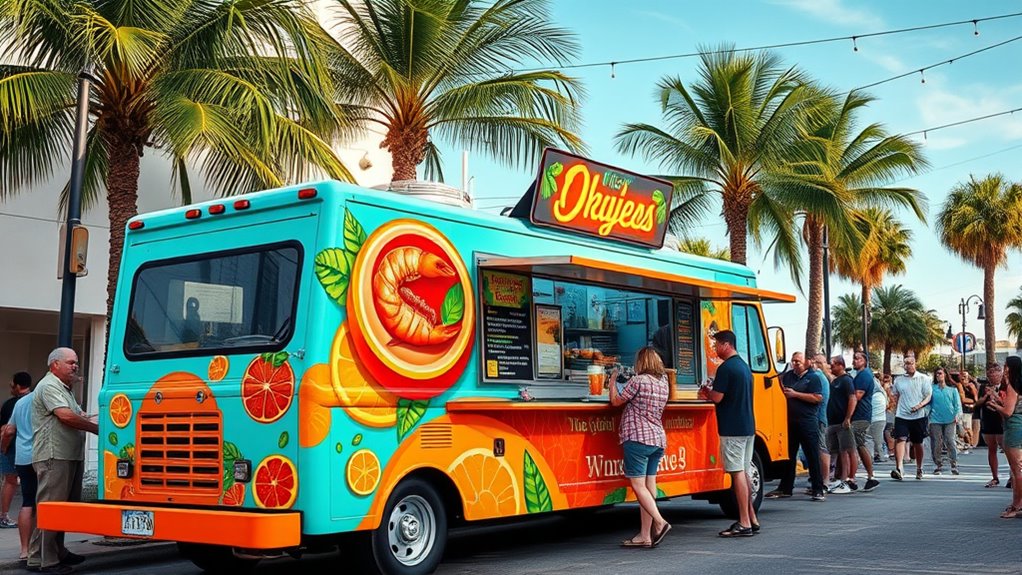
To boost your food truck’s visibility, consider using popular event scheduling apps to connect with local happenings. Engaging with local food bloggers can also help spread the word and attract new customers. Combining these strategies keeps your presence growing steadily in St. Petersburg’s vibrant food scene.
Popular Event Scheduling Apps
Choosing the right event scheduling app can substantially boost your food truck’s visibility and attract more customers. These apps streamline your planning, enhance your food truck branding, and improve social media marketing efforts. Consider these top options:
- Eventbrite – Perfect for promoting your appearances and managing ticket sales.
- Facebook Events – Widely used, helping you target local audiences and share updates.
- Meetup – Connects you with communities interested in food events and gatherings.
- Google Calendar – A simple, effective tool for organizing your schedule and sharing it across platforms.
Using these apps keeps your schedule organized and accessible, ensuring customers know where to find you. They also help you leverage social media marketing, boosting your presence in St. Petersburg’s vibrant food scene and strengthening your food truck branding efforts.
Engaging Local Food Bloggers
Connecting with local food bloggers can particularly boost your food truck’s visibility in St. Petersburg. By forming food blogger collaborations, you can tap into their established audiences and create buzz around your offerings. Reach out to local influencers who align with your cuisine and invite them to try your dishes. This type of local influencer outreach helps you gain authentic reviews and social media mentions, expanding your reach naturally. Consider hosting blogger events or offering exclusive tasting sessions to encourage genuine content creation. Engaging regularly with food bloggers not only increases your exposure but also builds valuable relationships within the community. Focus on authentic interactions that highlight your unique menu, and you’ll see your presence grow organically through trusted voices.
Master Local Event Participation
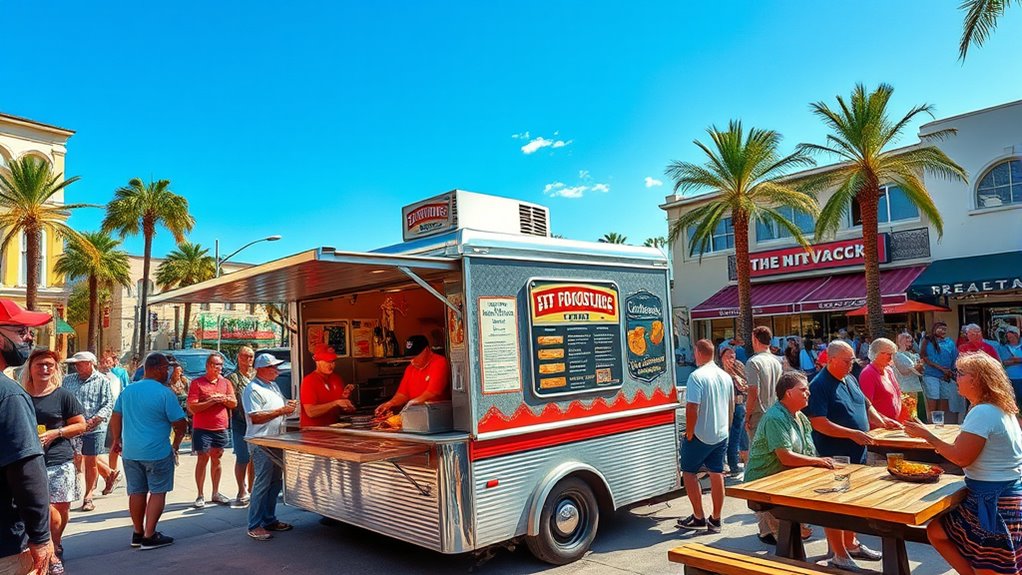
Participating in local events is one of the best ways to build your food truck’s reputation in St. Petersburg. To maximize your impact, consider these strategies:
Boost your food truck’s reputation in St. Petersburg by actively participating in local events.
- Secure event sponsorships to gain visibility and credibility.
- Partner with community organizations to strengthen local ties.
- Attend festivals, farmers markets, and street fairs regularly.
- Offer exclusive menu items or promotions for event attendees.
Frequently Asked Questions
What Permits Are Required for Food Trucks in St. Petersburg?
You need to obtain several permits for your food truck in St. Petersburg. First, get a food service permit from the Florida Department of Business and Professional Regulation. Then, secure a mobile food vendor permit from St. Petersburg regulations. You’ll also need a business license and possibly a parking permit if you plan to operate in specific areas. Make sure to check local zoning laws and health department requirements to stay compliant.
How Do I Find the Best Locations to Park My Food Truck?
To find the best locations to park your food truck, you should focus on parking strategies and location scouting. Visit busy areas like downtown St. Petersburg, near offices, parks, and events, during peak times. Use social media to identify high-traffic spots and get permission from property owners if needed. Flexibility and observation help you spot prime spots, ensuring you attract more customers and maximize your sales.
What Are the Common Challenges Faced by Food Truck Owners Locally?
You’ll face challenges like seasonal fluctuations that affect customer flow and revenue, especially during off-peak times. Equipment maintenance is essential to keep your truck running smoothly and avoid costly breakdowns. Managing permits and parking regulations can also be tricky. Staying adaptable, maintaining your equipment, and planning for seasonal changes will help you overcome these common local hurdles and keep your food truck thriving.
How Can I Build a Loyal Customer Base in St. Petersburg?
You can build a loyal customer base in St. Petersburg by creating vibrant, inviting experiences that draw people in. Use social media engagement to showcase your daily specials and behind-the-scenes moments, making followers feel connected. Participate in community events, turning your truck into a local hub of activity. As your aroma drifts through the streets and your friendly staff greet visitors, you’ll transform first-timers into regulars.
Are There Specific Health Regulations Unique to Florida’s Food Trucks?
Yes, Florida has specific health regulations for food trucks, including requirements for florida health inspections and mobile food safety. You need to pass routine inspections that focus on cleanliness, proper food storage, and safe cooking practices. Ensuring your truck meets these standards helps prevent violations and keeps your business compliant. Regularly review Florida’s mobile food safety guidelines to stay updated and maintain a high standard of health and safety for your customers.
Conclusion
Starting your food truck in St. Petersburg is more than just a venture—it’s your chance to create a culinary revolution. With dedication and smart planning, you can turn your passion into a thriving business that leaves a lasting mark on the city. Remember, every great food truck started with a single step; now’s your moment to roll out and make waves. The horizon’s yours—dare to dream big and serve up success!
